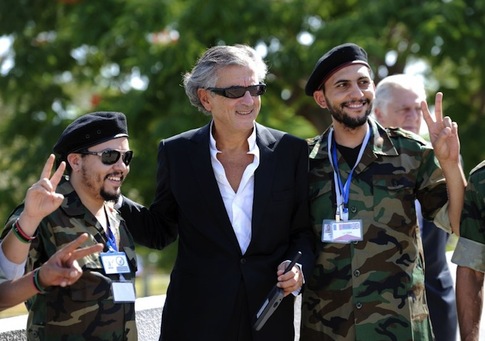Libya highlighted in “The Oath of Tobruk”
Rallying behind an insurgency borne out of the Arab Spring and emboldened by the fall of Muammar Kaddafi, helping to install a democratic government, those were the missions of French author and philosopher Bernard-Henri Lévy’s (B.H.L.) as he traveled between France and Libya last year cameras in tow.
As revealed in “The Oath of Tobruk” (a co-directed project shot entirely with Canon’s EOS 5D camera) B.H.L.’s involvement was key in preventing the Benghazi massacre. He describes in it how he recommended to former French president Sarkozy that he receive the provisional Free Lybia government in Paris. Reflecting on his visit at the Elysée palace newly-installed president Ben Jalil later said, “Paris was the place where we gained a victory.” That that same Ben Jalil would later show his true colors by making Sharia law the lay of the land in Libya illustrates the perennial intricacies of a region and its people. They’re not like us.
These contradictions make for potent on-screen drama, however. “Oath” crackles with spellbinding imagery (charred tanks dotting the land, entire towns which have been leveled). The David and Goliath quality of B.H.L.’s engagement in this ancient Arab country raises the stakes even more.
It’s hard not to be dazzled by this handsome French Jew in a sandy suit jacket and the trademark white shirt, a full head of hair blowing superciliously in the wind, walking alongside snipers, rallying on foot toward somewhere to hide when gunfire erupts. Tense sessions of declarations drafting alternate with constant telephoning various government contacts in attempts to organize a Libyan delegation. When he arrives in Misrata—the “Libyan Sarajevo” in his own words—the city was still under siege.
B.H.L. was involved first-hand in the operation to free Misrata by helping to organize a fleet of French combat helicopters to help neutralize Khaddafi forces gathered nearby and ready to pounce. Ironically, NATO, not notified on time, got in the way of the operation. Suspicions arose and a fiasco ensued.
War is a bad business. B.H.L’s optimism, however, and his efforts in trying to sort out an impossible situation (because beyond the tyranny lie the bigger stakes of what Samuel Huntington has called “the clash of civilizations,” which hopelessly complicates the affairs of the Middle East), coupled with some visible humanitarian accomplishments on the ground make “The Oath of Tobruk” essential to our understanding of what happened in this Arab Spring and beyond.
“The Oath of Tobruk,” co-directed by Bernard-Henri Lévy and Marc Roussel (Weinstein Company). No theatrical release date as of yet.

Bernard-Henri Lévy in Cannes with two Libyan insurgents







